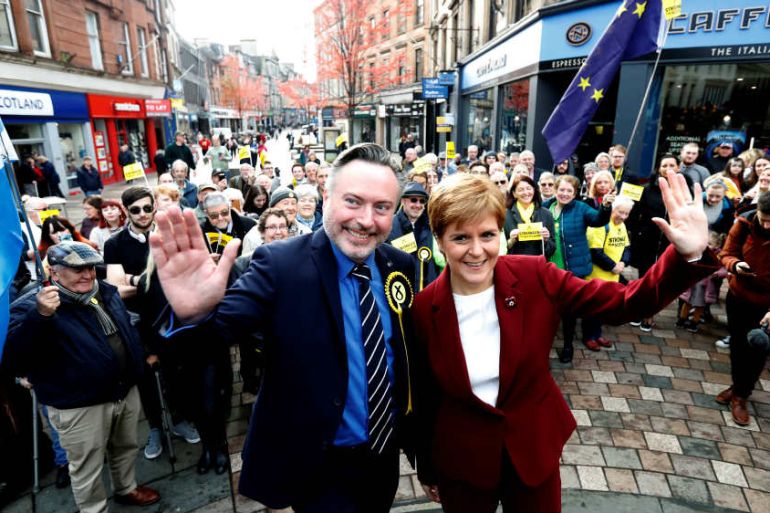Scottish independence in spotlight as UK election kicks off
SNP’s Nicola Sturgeon will take a strong showing for her party as an endorsement of another independence referendum.

Glasgow, United Kingdom – General election fever gripped Scotland this week after the House of Commons voted on Tuesday to trigger a United Kingdom-wide poll.
Mired in a political crisis which has seen Parliament repeatedly prove itself either unwilling or incapable of facilitating the UK’s departure from the European Union, British legislators are looking to the country’s voters to break the impasse.
Keep reading
list of 4 itemsFull jury panel seated on third day of Trump’s New York hush-money trial
Jacob Zuma’s nine lives: How South Africa’s ex-president keeps coming back
A flash flood and a quiet sale highlight India’s Sikkim’s hydro problems
The scheduled December 12 poll will be the third UK general election in four years, and the second since the nation’s 2016 in/out EU referendum saw the majority “leave” votes in England and Wales negate the “remain” majorities in Scotland and Northern Ireland to signal Britain’s intent to exit the 28-member European bloc.
While Britain’s Conservative prime minister Boris Johnson looks to secure a parliamentary mandate to make good on the UK’s vote to leave the EU, voters in Scotland will be weighing up another thorny constitutional concern: Scottish independence.
“This election will be dominated in Scotland by two major inter-connected constitutional questions – independence and Brexit,” James Mitchell, a public policy professor at the University of Edinburgh, told Al Jazeera.
“Other matters, including the economy and management of public services, will play a part but will be viewed through the prism of these big constitutional questions. It is likely to be one of the most robustly fought and angry elections in modern times.”
As the big beasts of the Scottish political scene, the pro-independence Scottish National Party (SNP) remain the party to beat. As the party of government at the Scottish Parliament since 2007, and currently topping Scotland’s opinion polls for the forthcoming general election, the pro-EU SNP are putting Scottish independence – its entire reason for being – front and centre of its campaign.
“I think [SNP leader] Nicola Sturgeon has simply learned the lesson of the 2017 election, when she announced plans for an independence referendum just before the campaign started, but tried to change the subject during the campaign itself to avoid scaring the horses,” said James Kelly of the pro-independence Scot Goes Pop! blog.
In the UK-wide 2017 election, the SNP won 35 of the 59 Scottish constituencies – a dramatic drop of 21 seats from the 56 they picked up in the 2015 general election.
This was, Kelly told Al Jazeera, “because opponents of [an independence] referendum saw an imminent threat and were highly motivated to vote for [the pro-UK] Conservative Party to stop it, but supporters of a referendum didn’t feel they had anything much to vote for.”
With support for Scottish independence currently polling at approximately 45-50 percent – in Scotland’s 2014 independence referendum, 45 percent of Scots backed Scottish statehood – Sturgeon has said that a vote for the SNP would be a vote to “demand Scotland’s right to choose independence” in a second independence poll.
“Sturgeon has tried to push an independence referendum up the agenda since the Brexit referendum,” said Mitchell. The SNP leader hopes that her consistent anti-Brexit stance will also appeal to Scotland’s majority pro-EU electorate.
“Her gamble is that there will be a hung Parliament, in which the SNP is pivotal” should the Labour Party, which has indicated it would not stand in the way of another Scottish sovereignty poll, win the largest number of seats – but not an overall majority – in December.
But, while projections suggest the SNP is on course to increase its seats in the House of Commons, Mitchell maintains that little about this forthcoming election is likely to be predictable.
“Sturgeon is gambling not only on her own party’s performance in Scotland but the outcome of the election in England,” he said. “While independence will be a major issue in the election, it is unlikely to result in a referendum and may deflate SNP support.”
Follow Alasdair Soussi on Twitter: @AlasdairSoussi